Disclaimer: This blog post contains affiliate links. If you make a purchase through these links, I may earn a small commission at no additional cost to you. Learn More. Thank you for supporting our garden community.
Best Organic Garden Mulch for Your Vegetables
Mulch is a powerful tool for vegetable gardeners, providing numerous benefits, including weed control, moisture retention, and soil enrichment. Whether you’re a beginner or an experienced gardener, learning the best organic garden mulch for your vegetables can significantly enhance your garden’s health and yields.
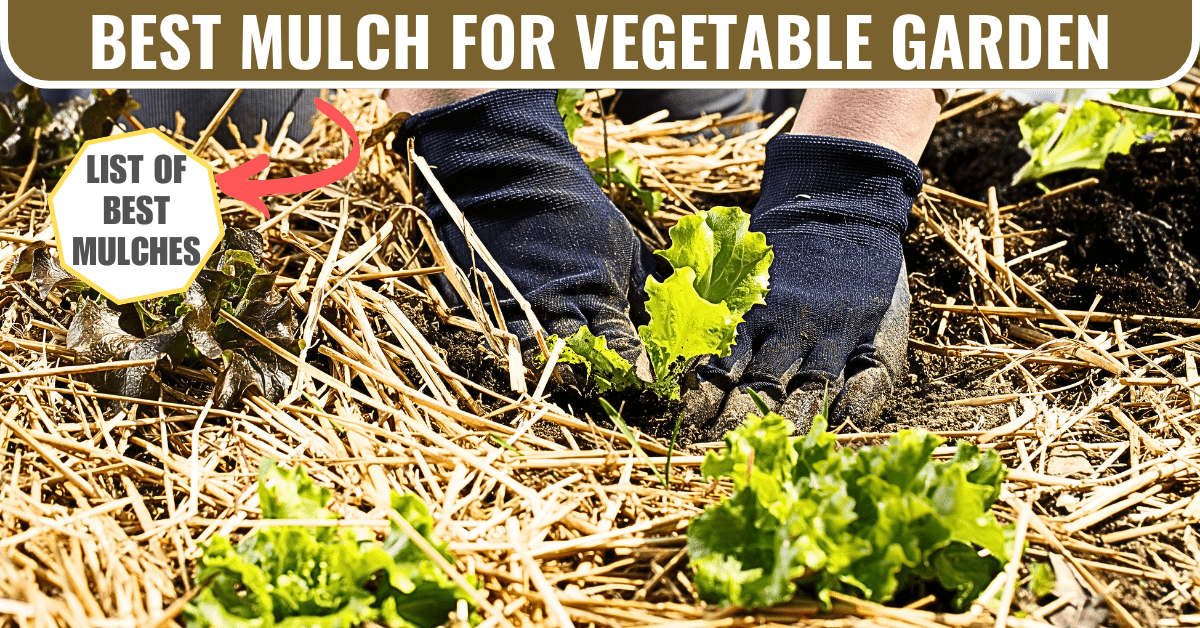
Best Organic Garden Mulch for Your Vegetables
Here’s what you’ll get from reading this post:
- The Types of Garden Mulch: You will gain an understanding of organic mulch options, their benefits, and how to choose the right type for specific gardening needs.
- Benefits of Mulching: This article explains how mulch improves soil health, controls weeds, retains moisture, regulates soil temperature, and enhances aesthetics.
- Proper Mulching Techniques: Guidance is provided on how to apply mulch correctly, including preparation, thickness, and spacing around plants to maximize its effectiveness.
- Avoiding Common Mulching Mistakes: You will learn about common pitfalls, such as over-mulching or placing mulch too close to plant stems, and how to avoid them for optimal garden health.
Products
To buy high-quality garden seeds, check out Burpee.
For a wide selection of perennial garden plants, check out Nature Hills Nursery.
For gardening equipment, check out Bootstrap Farmer.
Should You Leave Your Soil Bare or Cover it?
Ah yes, the age old gardening question.
My grandpa would say that mulch is a waste of time and that it does nothing for your garden.
But we know today (as I’m sure most people knew back then) that this is not true. Mulch is actually very important in the vegetable garden. Here’s why:
- Insulation: Mulch helps to insulate the soil from both extreme heat and extreme cold, allowing you to grow a greater variety of vegetables. This also allows you to extend your gardening season into the hottest summers and coldest winters.
- Water Retention: That being said, mulch reflects sunlight off of the soil surface. This means that less water will evaporate from the soil, meaning you won’t have to water every freaking day!
- Decomposition: As the mulch is left on the soil for a few months, it will naturally start to decompose. This acts as a sort-of compost, feeding your plants in the process.
- Weed Suppression: Think about it, if weeds try to grow but are blocked by something in the process, wouldn’t they just … die? Yes! Isn’t that beautiful? If you have a problem with weeds growing, you need to mulch your vegetable garden.
- Erosion Control: Heavy rains and winds can blow away soil from your garden beds. Mulch acts as a layer on top of the soil that prevents it from being blown or washed away.
So maybe my grandparents wouldn’t have mulched their vegetable garden, but they definitely should have!
Types of Organic Mulch
Organic mulches are far more beneficial to the soil than inorganic mulches (obviously), which is why I will only ever be caught using organic mulch.
Here we will cover the 5 best organic mulches for your vegetable garden.
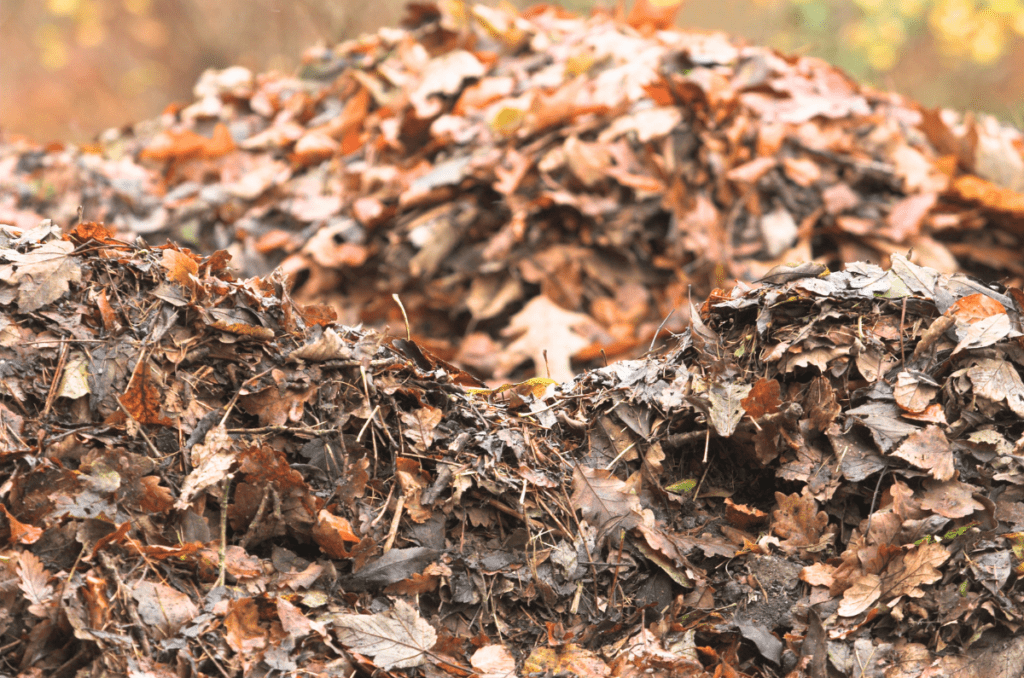
Shredded Leaves
Leaves are one of the easiest and cheapest mulches to obtain if you live in an area with many deciduous trees. They fall every year and are just waiting to be collected by a frugal gardener.
It is much easier if you have deciduous trees on your property, but you can also get leaves from public spaces like parks and trails. Try not to take them from somebody else’s property, or at least don’t get caught.
Without shredding the leaves, they will create a mat on your soil and go anaerobic. This means they will get moldy and may harm your plants.
Instead, use a lawnmower to shred the leaves on the ground. This will increase the surface area of the leaves and prevent them from growing mold.
Leaves are also great for attracting native beneficial bugs, as they creates the same conditions as a native forest.
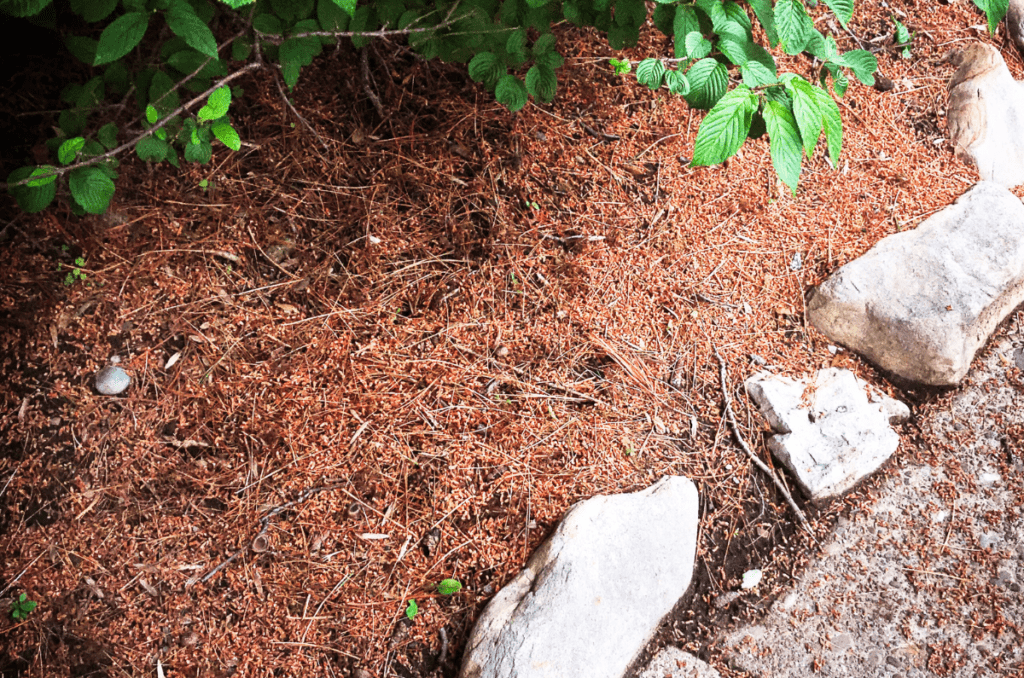
Pine Needles
Pine needles have a bad reputation among gardeners because they lower the pH of your soil, making it too acidic for vegetables.
This is almost entirely false.
While pine needles are acidic themselves, because the decomposition process is so slow, it basically does nothing to the pH of your soil.
But even if it did, it would be such a minor change that it still would not do anything in the grand scheme of things.
But even if we grant this, pine needles are used as a mulch that is going on top of your soil, not inside with your plants. So use them as you wish!
Although pine needles don’t fall as readily as leaves, it can be a good free source of mulch if you have many coniferous trees in your area.
The only problem I have with pine needles is that because they are so lightweight and thin, they may blow away in the wind easily.
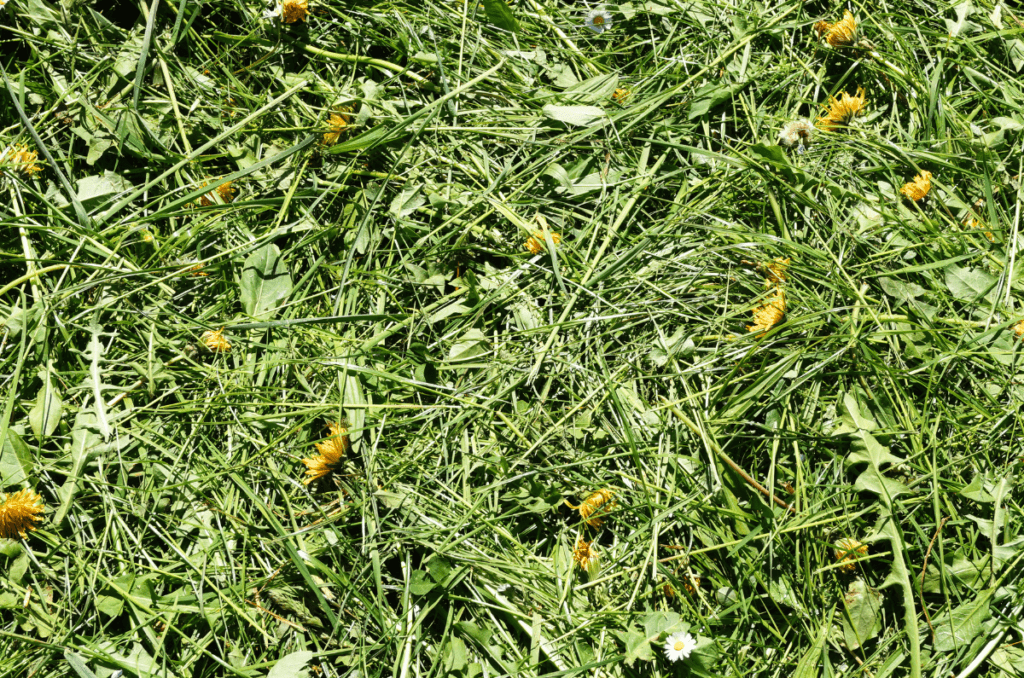
Grass Clippings
Grass clippings are a fresh, green mulch that can be an amazing mulch to incorporate into your garden.
Because they are fresh, grass clippings will decompose very quickly and provide quick nutrients for your vegetables.
And unlike other mulches, grass clippings provide nitrogen, which is one of the 3 plant macronutrients, meaning it is needed in the largest quantities.
On top of that, it is also free for most people, considering that it is a byproduct of mowing the lawn.
One thing to be aware of is that grass clippings are probably the most prone to going anaerobic and becoming moldy.
So try to fluff out the grass clippings and don’t press them down too much to allow for proper airflow.
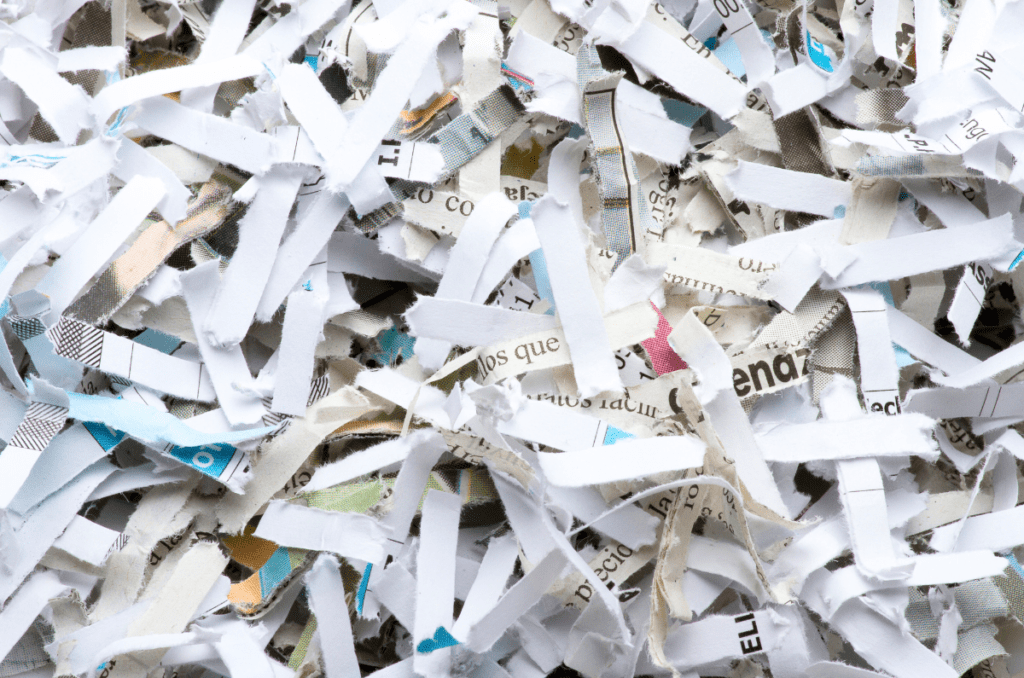
Paper / Cardboard
Paper mulch is becoming more popular among gardeners, as it is something that most people would consider to be garbage.
You can use any printer paper or cardboard that does not have glossy ink or other non-paper material.
For example: letters in the mail, newspaper, old printouts, courier packages, and more, can be used as a mulch for your vegetable garden.
If your neighbourhood still gets the newspaper delivered, then you know that it’s a shame to throw it out. So use it in your garden instead!
You can either shred the paper, or you can put down a flat layer of it and add another mulch on top of it.
I have had better success with shredded paper, especially when the pieces are longer.
If your paper shredder makes the pieces very small, then be careful that they don’t blow away in the wind.
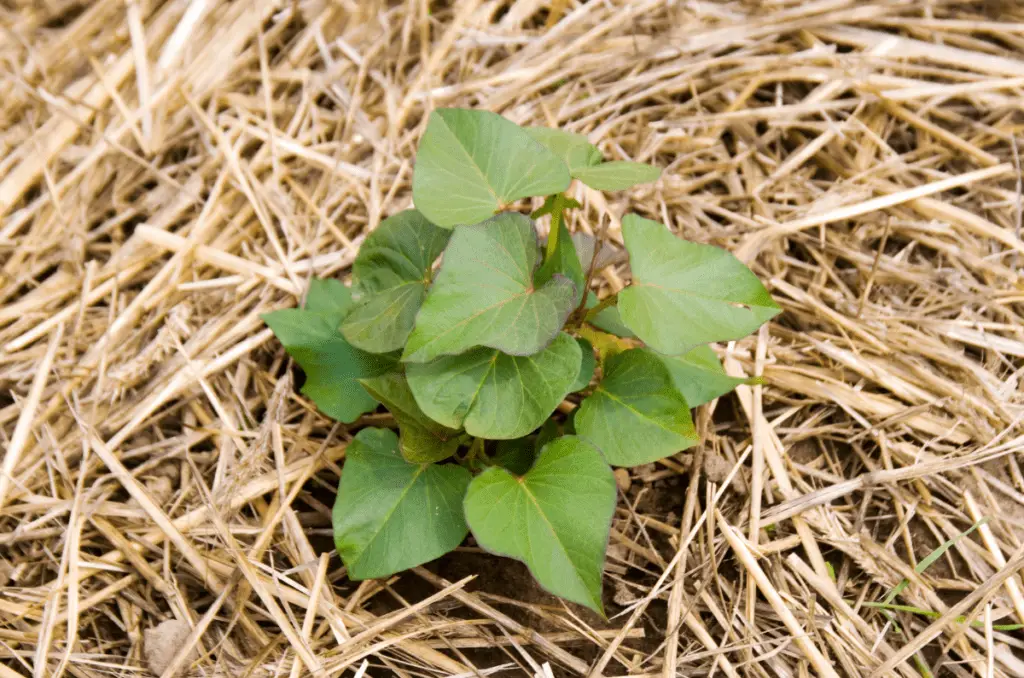
Straw
Don’t get straw confused with hay! Hay is grass that has been mowed and dried, meaning it contains many seeds that will sprout all over your garden. Straw is only the dried stalks of grass, meaning it is 99% weed-free.
Straw is considered by many organic gardeners to be the best mulch for the vegetable garden for several reasons.
Straw is lightweight, light in colour, easy and cheap to source, and weed-free.
Because it is so light in colour, it will reflect more light in the summer, allowing your plants to cool down.
There’s really not much more to say, other than you will probably have to buy it (unless you grow your own wheat, of course).
Straw is the ideal mulch for the vegetable garden.
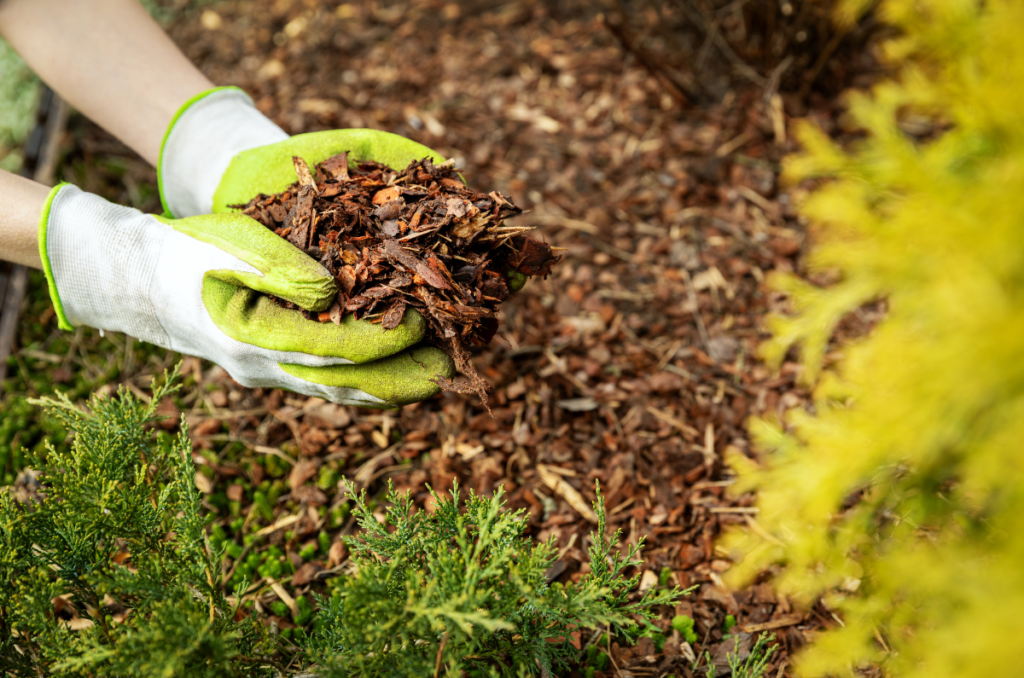
Bark / Woodchips
An honourable mention goes out to bark and woodchips.
Although they are a great mulch for perennials, trees, and fruit plants, they are not so great for the vegetable garden.
This is because they take a LONG time to decompose, while our vegetable gardens are typically filled with fast-growing annuals.
Woodchips are also good for garden pathways, considering the fact that they take a while to break down.
Stay away from woodchips from black walnut, as these contain a compound known as juglone, which is toxic to most garden plants.
How to Apply Garden Mulch
- Prepare the Area: Remove all the weeds in your garden and clear any spent plants.
- Timing: Mulch is best applied in early spring or late fall. I would lean more towards fall because it gives the mulch time to settle before planting right into the soil.
- Apply Evenly: Spread the mulch 2 to 3 inches thick across your entire garden bed, while leaving a 1 to 2 inch gap between plant stems. This helps to prevent the stems from rotting.
- Replenish the Mulch: Since organic mulches decompose over time, it is necessary to top up your garden beds with mulch every year or even twice a year.
Common Mulching Mistakes to Avoid
Please avoid these mistakes when applying mulch in your garden:
- Piling Mulch Against Stems: This can cause your plants to rot and introduce pests and diseases. Always leave a couple of inches between the mulch and the plant’s stem.
- Too Much Mulch: Any thickness more than 4 inches can cause the mulch to create a solid mat and go moldy. It can also block water and air from reaching the soil.
- Using the Wrong Mulch: Like I said, bark and woodchips are not ideal for the vegetable garden. Use the best organic mulch for your own needs.
Discussion Questions:
- What is your favourite mulch to use in the vegetable garden? Why do you like it so much?
Please let us know in the comment section below!
Frequently Asked Questions
Straw or shredded leaves are the best options for a no-dig garden. This is because they are lightweight and will decompose without having to be worked into the soil.
Avoid using any synthetic materials as a mulch for your vegetable garden. Don’t use landscape fabric, plastic, rubber, gravel, or anything else that will not decompose into your soil.
Because of the many deciduous trees in Ontario, the best mulch to use is shredded leaves. They are free, easy to collect, and very effective.
I like to put my mulch directly onto the soil, but you can also add a layer of paper or cardboard before you lay down your mulch.
Even More Gardening Ideas
Here are a few more posts to get the ball rolling in your garden!
- How to Grow Peas from Seed in Every Season
- The 10 Most Fragrant Flowers for Your Garden
- Nasturtium: The Garden Must-Have
If you enjoyed this article, make sure to share it with your friends and family members who are also looking to improve their gardening skills. Also, consider signing up for our email newsletter; don’t worry, we won’t send you spam, just fresh gardening tips and tricks every week!
If you want to learn more about gardening, foraging, and nature, check out The Real Gardener on LinkedIn, YouTube, and Pinterest.
Pin this post for later:

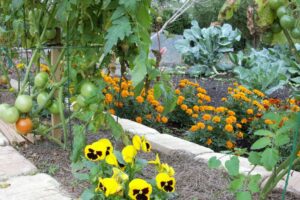
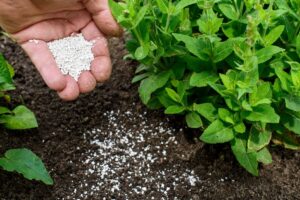
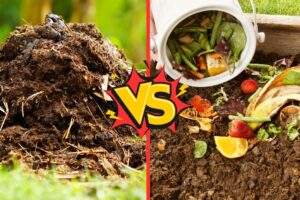
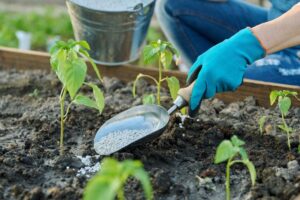
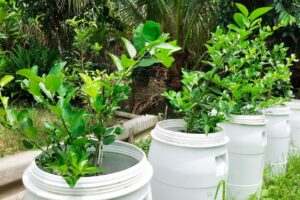
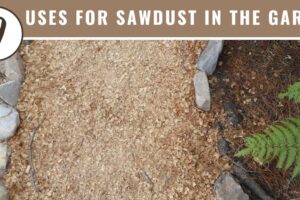
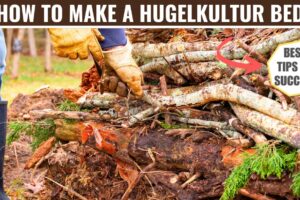
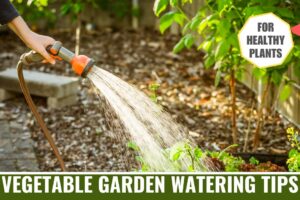
Leave a Reply